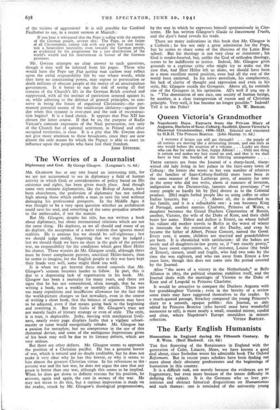The Early English Humanists
Humanism in England during the Fifteenth Century. By R. Weiss. (Basil Blackwell. 129. 6d.) THE first flowering of the Renaissance in England with the generation of Colet, Linacre, More, we have known a good deal about, since Seebohm wrote his admirable book The Oxford Reformers. But in recent years scholars have been finding out • more about their obscurer predecessors and the beginnings of humanism in this country. It is a difficult task, not merely because the evidences are so fragmentary, but even more because of the innate difficulty in defining the subject. It is the Germans who so love pre- tentious and abstract historical disquisitions on Humanismus and such themes : one is reminded of the university young
man in To the Lighthouse, who is for ever occupied with a thesis on the Influence of Somebody on Something. Not that Mr. Weiss's book is a case in point; it is the reverse: so far from being an abstractly argued essay, it is a mosaic of concrete information skilfully put together from fragmentary sources to make a continuous story. So much the better for that l In fact, he could have afforded to let himself go a bit: it is a very austere view of scholarship which deliberately refrains from giving us a description of the fire which destroyed Prior Selling's celebrated library at Canterbury.
Mr. Weiss tells us that his book " aims above all at showing the transition from mediaeval to Renaissance culture in this country, and the difficulties which had to be overcome to bring about such a change." He succeeds very well in piecing together one strand, and perhaps that the most important, in this com- plex change in the " climate of opinion ": namely, the cultural contacts between England and Italy. There were the Italian scholars visiting England, like Poggio, who was here from 1418-22; it is pleasant to think of the learned and facetious Italian enjoying the rural rectory of Drokensford in the diocese of Winchester. He was followed by other distinguished Italians, two of them in the service of Humphrey, Duke of Gloucester. Then there were the English students going to Italian universities, particularly Padua and Bologna, since the long war with France cut off their former access to the university of Paris. How pleasant, and provoking, it is to think of Padua and Bologna in maytime, and of an Italy as gracious and welcoming as she was to these scholars or to the English poets of the last century ! One of these fifteenth- century Englishmen, Robert Flemming, went on to the Curia and wrote a poem, the Lucubratiunculae Tiburtinae, to celebrate the stall of the Papal Court out in the hills of Tivoli: how one remembers the olive-groves, the wistaria-like vines hanging over the terraces, the noise of rushing water through those gorges.
Mr. Weiss brings out the very important part played by Duke Humphrey as a patron of Italian scholars and of letters in England. His munificent gifts of manuscripts to Oxford had great influence in communicating the new impulse to studies which Oxford was in need of at that time. It is to be remarked how much Oxford was the centre and the furtherer of the new scholarship, and how practically every one of the humanist scholars imbibing the new standards from Italy were Oxford men. So, too, with the great men of the next genera- tion: Grocyn, Colet, Linacre, More. Except for Tyndale, the Reformation may be regarded as a Cambridge triumph.
Mr. Weiss has performed his difficult, chosen task with admir- able scholarship and skill. He has brought out of the shades into the light such figures as Bishops Beckington and Grey, Robert Flemming and John Free, Prior Selling, about whom little enough has been known. It is much to be hoped that he will continue his work into the period when the labours of these obscurer predecessors bore fruit in the first flush of the English Renaissance.
A. L. ROWSE. A. L. ROWSE.



























 Previous page
Previous page